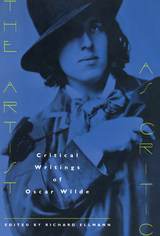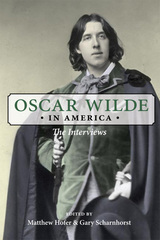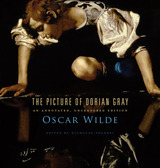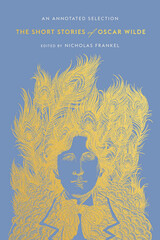
“The truth is rarely pure and never simple,” declares Algernon early in Act One of The Importance of Being Earnest, and were it either, modern literature would be “a complete impossibility.” It is a moment of sly, winking self-regard on the part of the playwright, for The Importance is itself the sort of complex modern literary work in which the truth is neither pure nor simple. Wilde’s greatest play is full of subtexts, disguises, concealments, and double entendres. Continuing the important cultural work he began in his award-winning uncensored edition of The Picture of Dorian Gray, Nicholas Frankel shows that The Importance needs to be understood in relation to its author’s homosexuality and the climate of sexual repression that led to his imprisonment just months after it opened at London’s St. James’s Theatre on Valentine’s Day 1895.
In a facing-page edition designed with students, teachers, actors, and dramaturges in mind, The Annotated Importance of Being Earnest provides running commentary on the play to enhance understanding and enjoyment. The introductory essay and notes illuminate literary, biographical, and historical allusions, tying the play closely to its author’s personal life and sexual identity. Frankel reveals that many of the play’s wittiest lines were incorporated nearly four years after its first production, when the author, living in Paris as an exiled and impoverished criminal, oversaw publication of the first book edition. This newly edited text is accompanied by numerous illustrations.

“And I? May I say nothing, my lord?” With these words, Oscar Wilde’s courtroom trials came to a close. The lord in question, High Court justice Sir Alfred Wills, sent Wilde to the cells, sentenced to two years in prison with hard labor for the crime of “gross indecency” with other men. As cries of “shame” emanated from the gallery, the convicted aesthete was roundly silenced.
But he did not remain so. Behind bars and in the period immediately after his release, Wilde wrote two of his most powerful works—the long autobiographical letter De Profundis and an expansive best-selling poem, The Ballad of Reading Gaol. In The Annotated Prison Writings of Oscar Wilde, Nicholas Frankel collects these and other prison writings, accompanied by historical illustrations and his rich facing-page annotations. As Frankel shows, Wilde experienced prison conditions designed to break even the toughest spirit, and yet his writings from this period display an imaginative and verbal brilliance left largely intact. Wilde also remained politically steadfast, determined that his writings should inspire improvements to Victorian England’s grotesque regimes of punishment. But while his reformist impulse spoke to his moment, Wilde also wrote for eternity.
At once a savage indictment of the society that jailed him and a moving testimony to private sufferings, Wilde’s prison writings—illuminated by Frankel’s extensive notes—reveal a very different man from the famous dandy and aesthete who shocked and amused the English-speaking world.

Included in Richard Ellmann's impressive collection of Wilde's criticism, The Artist as Critic, is a wide selection of Wilde's book reviews as well as such famous longer works as "The Portrait of Mr. W.H.," "The Soul Man under Socialism," and the four essays which make up Intentions. The Artist as Critic will satisfy any Wilde fan's yearning for an essential reading of his critical work.
"Wilde . . . emerges now as not only brilliant but also revolutionary, one of the great thinkers of dangerous thoughts."—Walter Allen, New York Times Book Review
"The best of Wilde's nonfictional prose can be found in The Artist as Critic."—Michael Dirda, Washington Post Book World



The Picture of Dorian Gray altered the way Victorians understood the world they inhabited. It heralded the end of a repressive Victorianism, and after its publication, literature had—in the words of biographer Richard Ellmann—“a different look.” Yet the Dorian Gray that Victorians never knew was even more daring than the novel the British press condemned as “vulgar,” “unclean,” “poisonous,” “discreditable,” and “a sham.” Now, more than 120 years after Wilde handed it over to his publisher, J. B. Lippincott & Company, Wilde’s uncensored typescript is published for the first time, in an annotated, extensively illustrated edition.
The novel’s first editor, J. M. Stoddart, excised material—especially homosexual content—he thought would offend his readers’ sensibilities. When Wilde enlarged the novel for the 1891 edition, he responded to his critics by further toning down its “immoral” elements. The differences between the text Wilde submitted to Lippincott and published versions of the novel have until now been evident to only the handful of scholars who have examined Wilde's typescript.
Wilde famously said that Dorian Gray “contains much of me”: Basil Hallward is “what I think I am,” Lord Henry “what the world thinks me,” and “Dorian what I would like to be—in other ages, perhaps.” Wilde’s comment suggests a backward glance to a Greek or Dorian Age, but also a forward-looking view to a more permissive time than his own, which saw Wilde sentenced to two years’ hard labor for gross indecency. The appearance of Wilde’s uncensored text is cause for celebration.

An innovative new edition of nine classic short stories from one of the greatest writers of the Victorian era.
“I cannot think other than in stories,” Oscar Wilde once confessed to his friend André Gide. In this new selection of his short fiction, Wilde’s gifts as a storyteller are on full display, accompanied by informative facing-page annotations from Wilde biographer and scholar Nicholas Frankel. A wide-ranging introduction brings readers into the world from which the author drew inspiration.
Each story in the collection brims with Wilde’s trademark wit, style, and sharp social criticism. Many are reputed to have been written for children, although Wilde insisted this was not true and that his stories would appeal to all “those who have kept the childlike faculties of wonder and joy.” “Lord Arthur Savile’s Crime” stands alongside Wilde’s comic masterpiece The Importance of Being Earnest, while other stories—including “The Happy Prince,” the tale of a young ruler who had never known sorrow, and “The Nightingale and the Rose,” the story of a nightingale who sacrifices herself for true love—embrace the theme of tragic, forbidden love and are driven by an undercurrent of seriousness, even despair, at the repressive social and sexual values of Wilde’s day. Like his later writings, Wilde’s stories are a sweeping indictment of the society that would imprison him for his homosexuality in 1895, five years before his death at the age of forty-six.
Published here in the form in which Victorian readers first encountered them, Wilde’s short stories contain much that appeals to modern readers of vastly different ages and temperaments. They are the perfect distillation of one of the Victorian era’s most remarkable writers.

“Now, for the first time, we can read the version that Wilde intended…Both the text and Nicholas Frankel’s introduction make for fascinating reading.” —Paris Review
More than 120 years after Oscar Wilde submitted The Picture of Dorian Gray for publication in Lippincott’s Monthly Magazine, the uncensored version of his novel appears here for the first time in a paperback edition. This volume restores all of the material removed by the novel’s first editor.
Upon receipt of the typescript, Wilde’s editor panicked at what he saw. Contained within its pages was material he feared readers would find “offensive”—especially instances of graphic homosexual content. He proceeded to go through the typescript with his pencil, cleaning it up until he made it “acceptable to the most fastidious taste.” Wilde did not see these changes until his novel appeared in print. Wilde’s editor’s concern was well placed. Even in its redacted form, the novel caused public outcry. The British press condemned it as “vulgar,” “unclean,” “poisonous,” “discreditable,” and “a sham.” When Wilde later enlarged the novel for publication in book form, he responded to his critics by further toning down its “immoral” elements.
Wilde famously said that The Picture of Dorian Gray “contains much of me”: Basil Hallward is “what I think I am,” Lord Henry “what the world thinks me,” and “Dorian what I would like to be—in other ages, perhaps.” Wilde’s comment suggests a backward glance to a Greek or Dorian Age, but also a forward-looking view to a more permissive time than his own repressive Victorian era. By implication, Wilde would have preferred we read today the uncensored version of his novel.
READERS
Browse our collection.
PUBLISHERS
See BiblioVault's publisher services.
STUDENT SERVICES
Files for college accessibility offices.
UChicago Accessibility Resources
home | accessibility | search | about | contact us
BiblioVault ® 2001 - 2024
The University of Chicago Press









